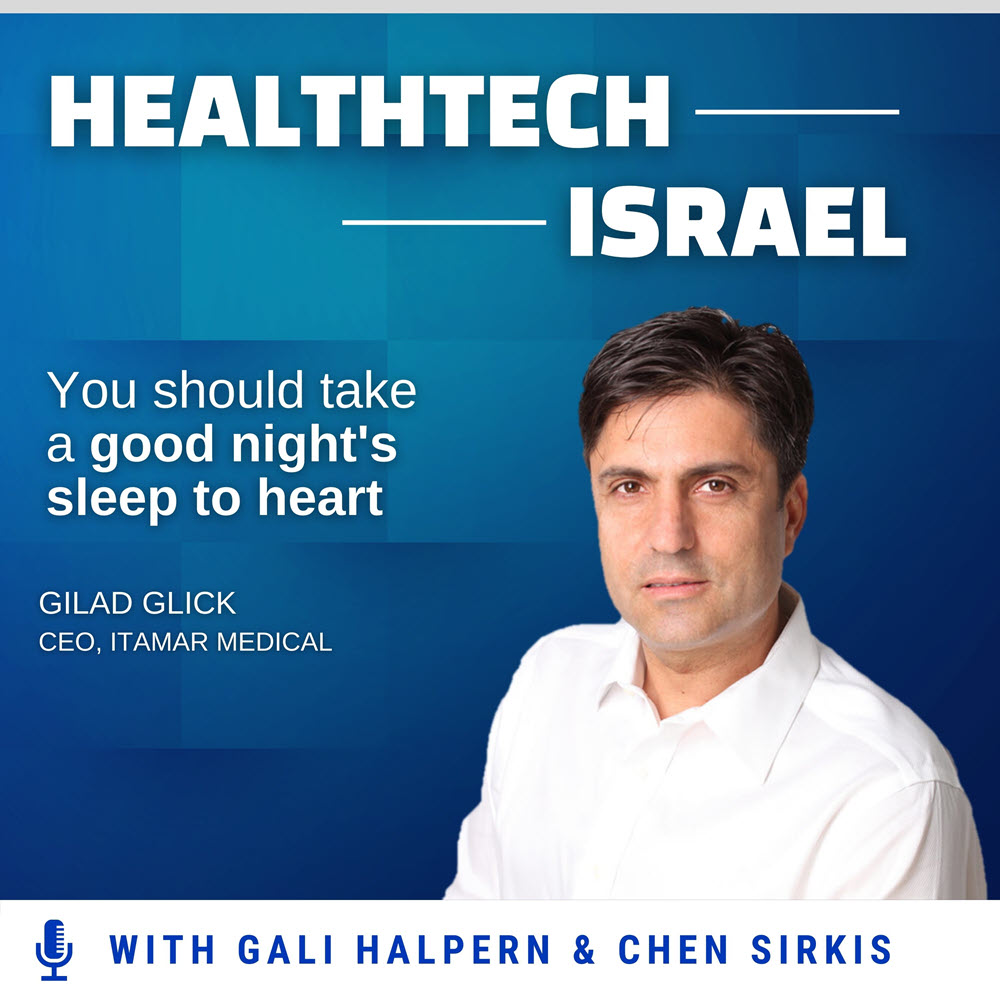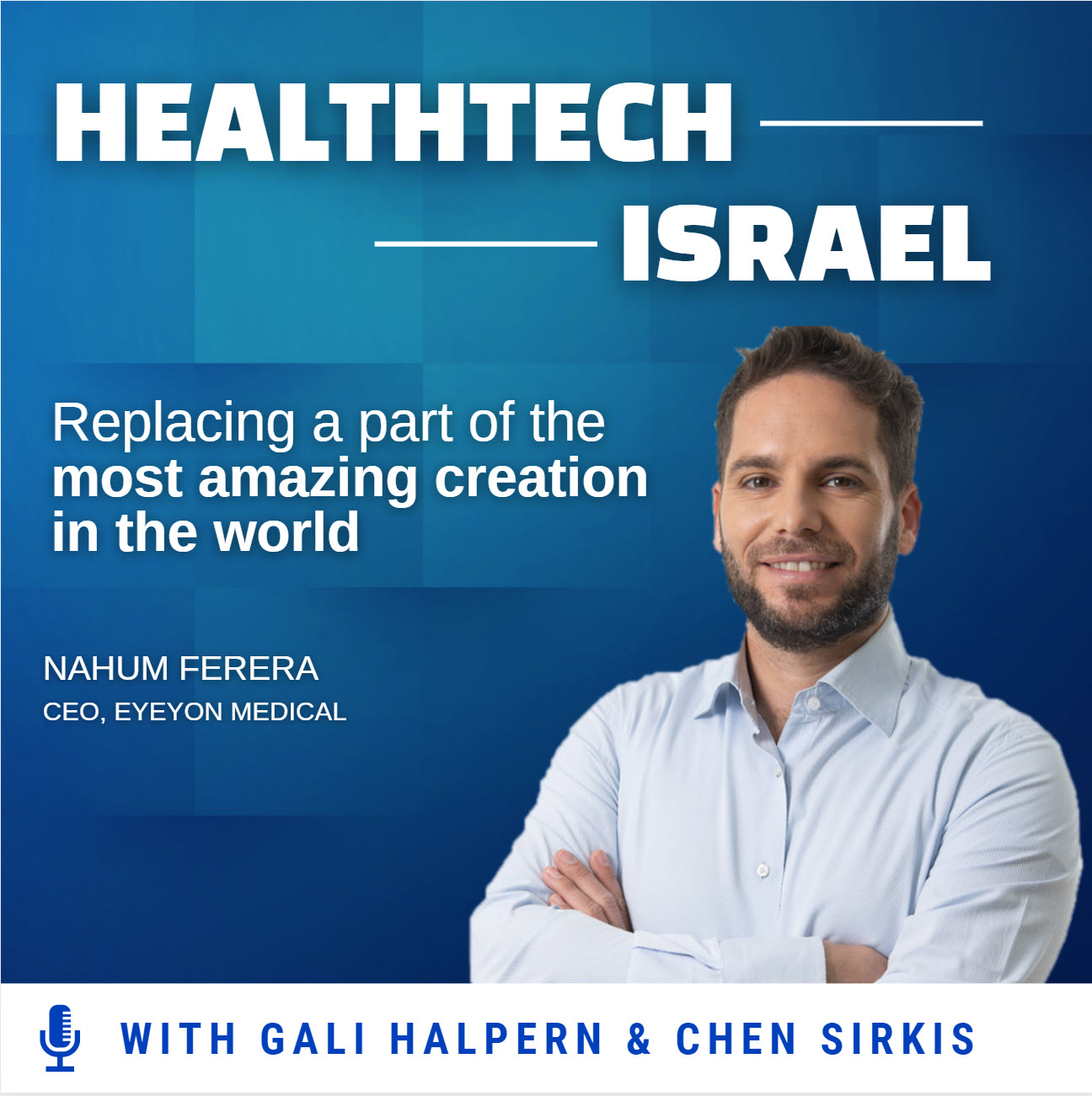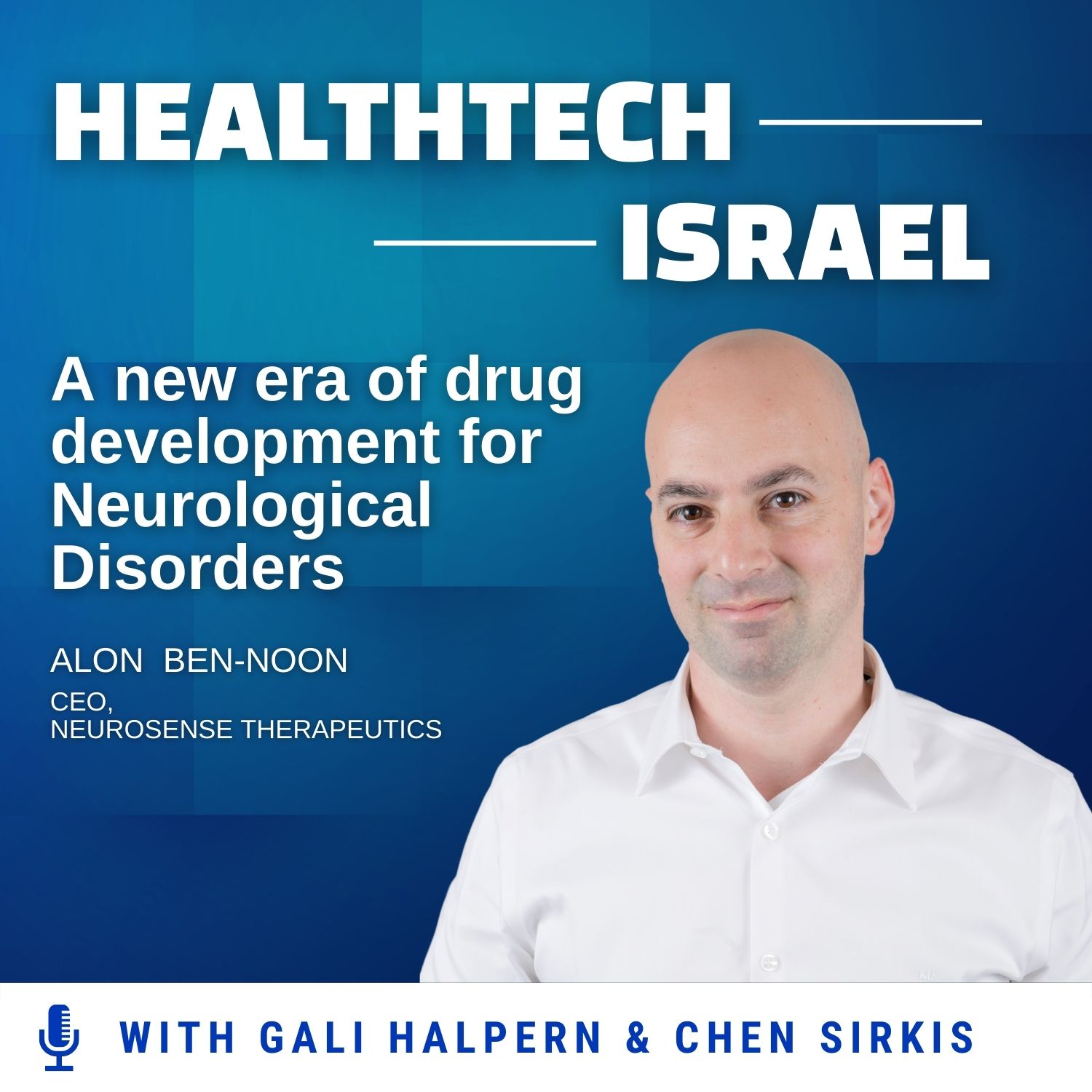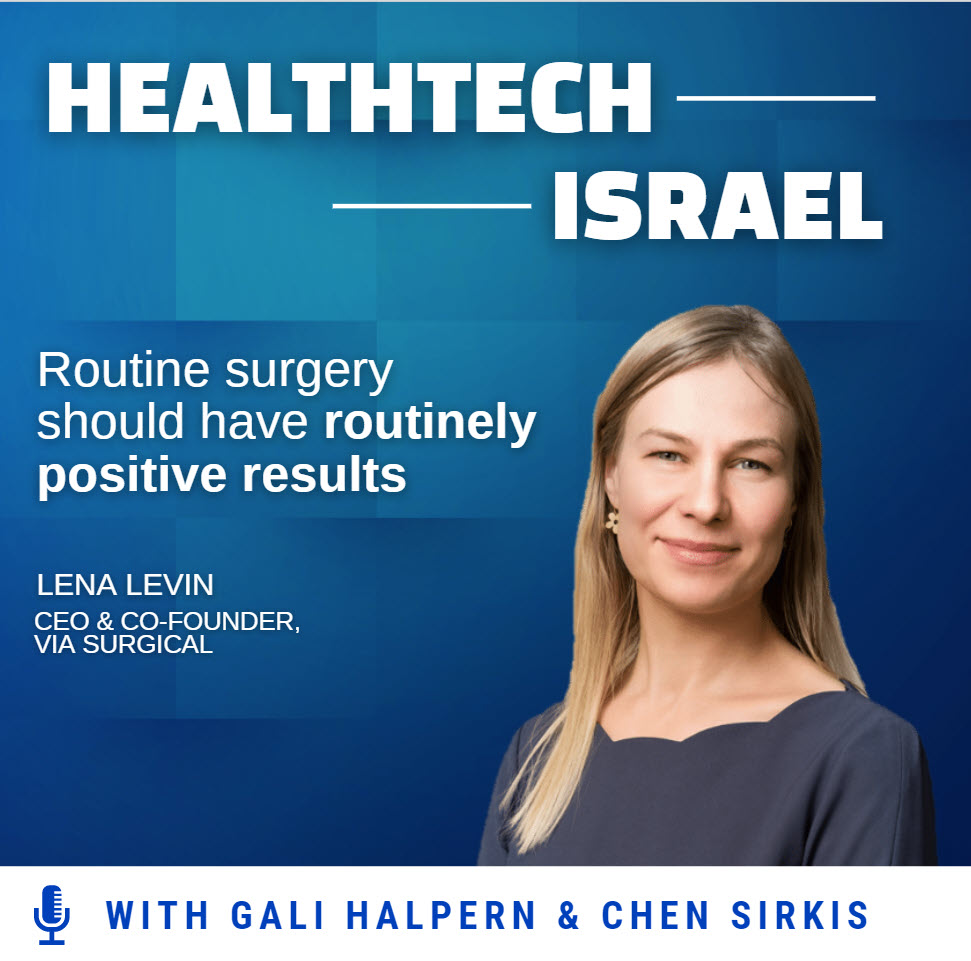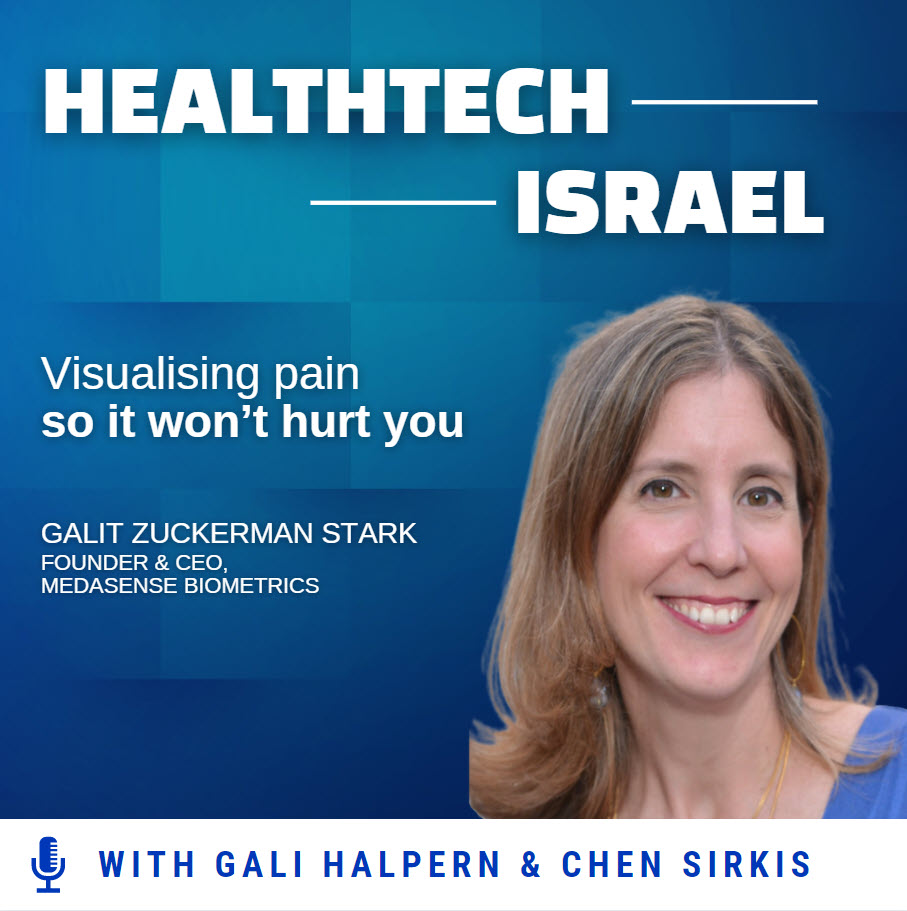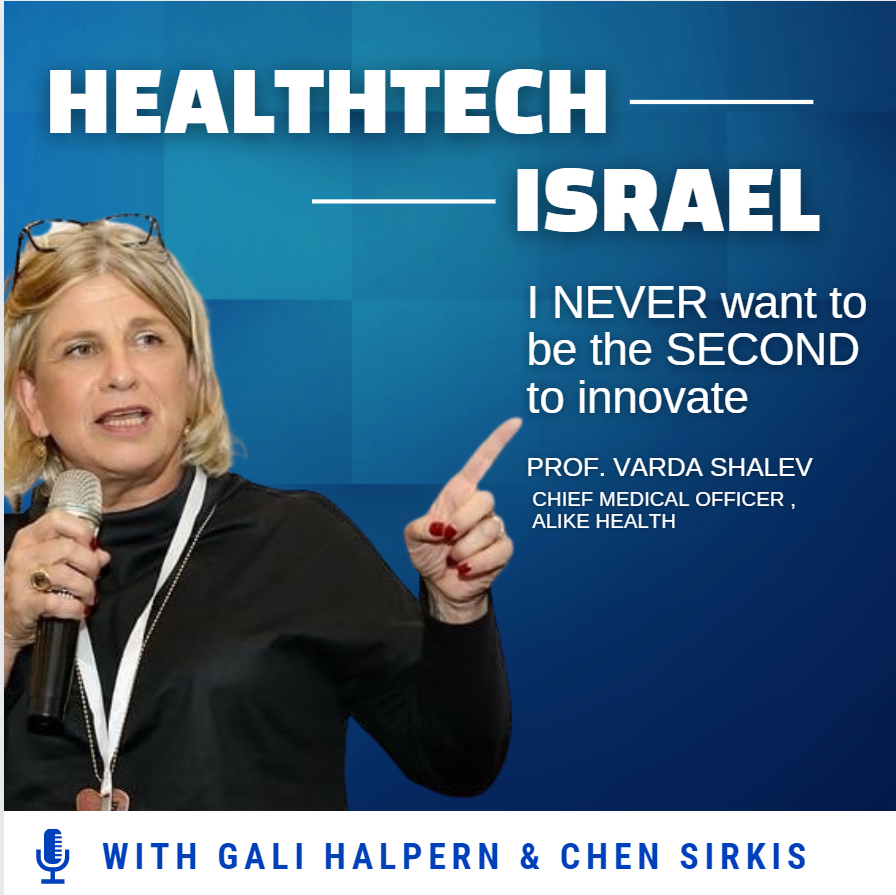Omri shor
CEO, medisafe
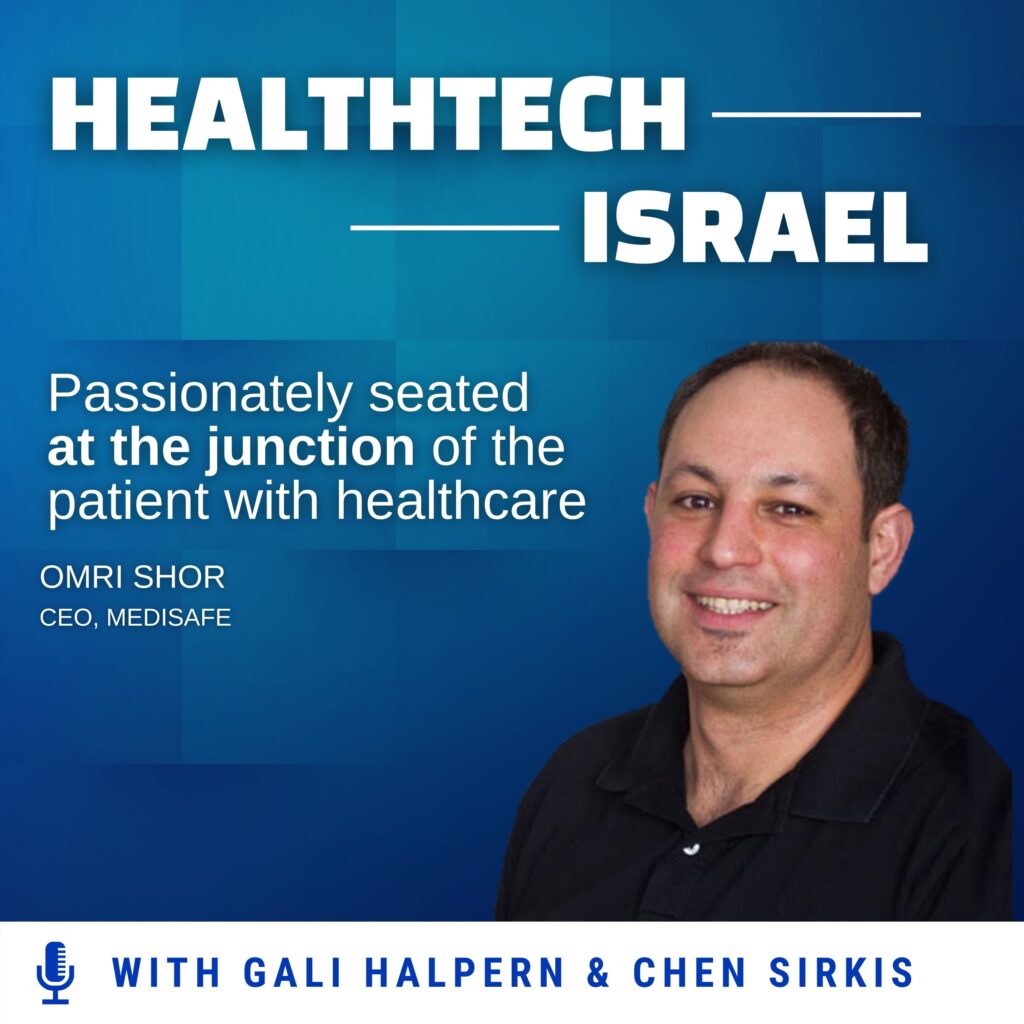
Omri Shor is the cofounder and CEO of Medisafe. Where for the last decade, he and his team are trying to free patients from the stress of managing complicated medications, thus enabling them to lead healthier, safer and fuller lives.
Show Notes
Omri Shor is the co-founder and CEO of Medisafe, where for the last decade, he and his team are trying to free patients from the stress of managing complicated medications, thus enabling them to lead healthier, safer, and fuller lives.
01:00 Omri talks about the story behind the founding of Medisafe
02:28 How is it like starting a business with your own brother and still managing it today after nearly a decade?
04:21 How has Medisafe's product evolved from what you thought you were doing when you began to where you are now.
07:06 How does Medisafe ensure that the patients get the right medication, at the right dose and at the right time?
09:06 Omri offers examples of strange adherence-related behaviors that he wouldn't have even imagined?
13:51 Omri talks about the main things that he wishes he had known a few years ago working and navigating in healthcare organizations and pharma companies. What would he recommend to those who wish to sell into these systems?
16:43 “We dare!”. The unique culture of Medisafe
18:27 Why would anyone want to work at Medisafe?
23:00 How does the company maintain its fast-moving, exciting spirit of a startup when the company is not that small.
25:40 How has the business model of Medisafe shifted throughout the years?
31:14 Omri elaborates on how Medisafe sits at major junctions throughout the patient's continuum of care. In what was does the company combine the tech, the AI, big data, etc., with the behavioral aspects of the patient's needs.
34:32 Does Omri view the elderly population as a separate group and make sure that you're creating a solution that is relevant for them?
35:48 Omri talks about using the company's JITI and Maestro technologies to build the patient journey.
40:59 Omri talks about his move to the US. Was it a must and how has that move affected him on a business and personal level?
44:12 What's next for Medisafe? And what is Omri's best tip to aspiring digital health entrepreneurs?
Interview Transcription (mild edits)
Having a good story is essential for every business. The story behind Medisafe is a personal one and as personal as can be. And it all started with your father. Correct?
That is indeed the case. So our story starts about 8 years ago. My father is diabetic and hypertensive. And it starts up in the north of Israel with a nice Saturday barbecue where we came to his house. And at some point, he asked me if I've seen him injected his insulin today. And I gave him a very straightforward answer. It was 'No'. By 'No', I meant, 'No, I haven't seen you inject insulin'. But unfortunately, he understood that as, 'No, you haven't injected'. So, he did the rational thing. He injected a dose of insulin, which eventually was the second one in a row. Glucose levels dropped to a near diabetic shock situation. We gave him with glucose, sending him for medical attention, and subsequently to a happy ending.
From this one father, we now have nearly 7.5 million registered users. But that was the catalyst for us to think about how big is the problem of medication management for individuals. And maybe later, we can talk about what is the general problem across the entire US population.
You established the company with your brother. What was that like? Starting the business with your brother and still managing it today after nearly a decade.
Yeah, so we cofounded the business together. Today's Wednesday. So today, on Wednesday, we call him my cofounder and CTO; brother is over the weekend. So, we meet together for the weekend, we have a lot of fun. We have casual conversations, and then on the weekdays and we're business partners. And that distinction is very important for us. And also, very important for everyone who's at the company because it's not a family owned business. It's a venture-backed startup. We've raised a lot of money, we have a board of directors, and we're absolutely super professional with how we're managing the company together. Rotem (Shor) is in charge of product, R&D, data and everything in between. And I'm in charge of the business side of the company, and also CEO of both sides. He's in charge of the Israeli side. He's managing the team there. And I'm talking to you from Boston.
Let's talk about Medisafe. You started off as a medication management tool. Can you tell us a bit about how your product has evolved from what you thought you were doing when you began to where you are right now?
Sure. So as a product, we said, 'Well, let's start with the problem', right, 'and quantify it.' So, mismanagement of medications; it's a huge problem, especially in the US. 700,000 people a year suffer in emergencies and every four minutes an American dies from mismanagement of medications. That's 125,000 people a year. So, it's a huge problem.
If you quantify it with dollars, according to the Congressional Budget Office, it is $300 billion dollars a year. It's 10% of the US healthcare budget. So, it's huge and it's deemed to be solved. So, we've decided that we're going to be the company that solves the issues of medication management.
So, when we started, we've started with a reminder system with a failsafe that notifies a family member, if you haven't taken your medications. We call that feature Medfriend and it is still active with us today. But throughout the years, what we really understood is that it's a really complicated problem to solve.
There is a reason that no one had solved it before. And the problem is that each and every individual has their own issues with medication mismanagement; each and every person has a world by its own. So, what we really need to do is to understand the patient journey, from the moment that one gets prescribed throughout the entire healthcare process for that individual.
And then be able to tailor the messages throughout the journey for each and every individual based on their profile. So, what we really do is based on data to build profiles of people, and then decide what messages should they get at each and every point in time. We've built an AI engine for this, it's called JITI. JITI stands for Just In Time Intervention and that's what JITI does for us.
How does Medisafe ensure that the patients get the right medication, at the right dose and at the right time?
So as I said, we manage the journey. So, from the moment that the patient really sets up Medisafe, we provide notifications throughout the constant process. But alongside each and every notification there will be a series of messages. So, the message could be, how important is this medication is to you, become a healthier you, see some other patients' videos, learn about other's journeys, identify dangerous drug to drug interactions.
So, we've implemented a DDI, drug to drug interactions engine inside Medisafe and I haven't checked the number this year. But last year, when I did, we've identified 100,000 interactions for patients; some of them were deadly. So, we're very fortunate to be in that intersection of healthcare with patients; healthcare with consumer. And try to be the last line of defense before something bad happens; making sure that only the good things happen.
It's very difficult to convince people to do things that are good for them. They're very good at doing things that are bad for them. But when you try to actually help them, they're usually not very responsive. And adherence is a big issue. Can you give us some examples of very strange behaviors that you've seen with people that you wouldn't have even imagined?
Omri Shor: I'll give you one, it's a extremely simplistic but it just explains the situation. We are working with one of the top three pharma companies on a biologic injectable drug. And the story there is that patients are injecting it every two weeks. And they're encouraged to start the injection process throughout the weekend. And why? Well, weekend, you're less busy, you're at home, you have time.
This whole process is that you need to take it out of the fridge, leave it out for 30 minutes to get it to room temperature and then you need to inject; it's self-injectable. And what we found out is that people who are injecting the drug on Tuesdays, or Fridays, our 8% to 10% higher on adherence. We ask ourselves, why is that the case?
What we found out is that ... What do you guys do over the weekend? I have life; I bike, I run, I swim, I go with the kids and hike. And I don't want to worry about health care during the weekend, this is my off time. So, what we found out is that Tuesday and Friday mornings are far better to have someone inject their medications.
We're talking about 10% increase in adherence. That would be a massive value for the patient from a health outcomes perspective. And obviously, for the pharma company, the impact could be if every patient would have done that, potentially 10% increase in their total lifetime value from the patient. This is a drug of $6,000 a month.
So, the impact is $600 a month. It's a lot of money for something really small. It grows and become far more sophisticated. So, we integrate with the Patient Support Services; hubs, if you will in the US. And we've been able by streamlining the process of communication between the hub and the patient. We were able to improve the patient to nurse communication by around 80%. Again, simple. It's a simple solution that it took AI to solve it, but most of us don't pick up the phone when they see an unidentified number. So, we've implemented just two small tricks. The first one is that when a patient signs up on Medisafe, we say, 'Hey, if nurse calls you it will come as an unidentified number. Would you like to put her number inside your phone's contacts?'
And from this point in time, it's not an unrecognized number anymore. So easy. The second one is that we give a heads up. Say, 'Hey, in 10 minutes, your nurse is going to call. Pick up the phone.' And if you've missed it, then we're going to send another notification saying, 'That was your nurse calling you. She's going to call again in 10 minutes, pick up the phone.' So, just by improving some small touch-ups around the patient journey, we're able to create a massive impact.
Just like in life, sometimes it's just the small things that make a huge, huge difference. But if we talked about things that are small, let's talk about things that are a little bit bigger; navigating in healthcare organizations and pharma companies. What are the main things that you know now, you wish you had known a few years ago working in, and navigating in these enormous systems? And what would you recommend those who wish to sell into these systems as well?
Omri Shor : Yeah. I would say healthcare is tough. Selling in healthcare is probably the most challenging thing that an entrepreneur can take. Here's the scoop, adherence to medicine is good for everyone. Improved patient journey and better patient outcomes engagement is good for everyone. So, then the question is, who's going to pick up the bill?
And we've built a model that speaks about the different constituents across healthcare (Speak to all consituants across healthcare), We call them the 6 P's; patient, provider, payer, pharma, pharma wholesalers and pharmacies. These are the 6 P's. It took us a lot of time to figure out who should we sell to and how do we get to them. And as our chairman says, 'Focus is everything in life and it's the art of saying what you're not going to do.'
So, the decision, is that we are not selling to providers. As Israelis, in many cases, and I'm at fault as well. In many cases, we charge forward first and only then we think about the strategy. And if I would be myself 10 years ago, I would say, 'Hey, think more and execute after.' So, I'm not saying spend six to 12 months on planning. But I am saying, give it some thought, interview folks, come up with a really good strategy and then move forward. I've made mistakes of asking the team to deliver a certain piece of the platform. Eventually, we found out that was not successful; mistake, failure, if you wish. And you need to recognize that and fix it from that point forward.
We have a unique culture at Medisafe. And our second value at Medisafe is saying "We dare!". So, there are companies that play offense, there are companies that play offense and defense. We play offense. We're always charging forward. And as part of that, when you're encouraging your team to run always faster; kind of a culture of get it done, then get it better.
You make mistakes along the way; you fail quite a lot. But it's worth it if you are able to learn from it quickly. So, I'm saying to you, you have all the freedom in the world to make mistakes. All right, just try to learn and don't make the same mistake twice. The year is 365 days, right? Make 365 mistakes. Why waste a few days on making the same mistake twice?
It sounds like you have structure than organizational culture. So, how many people are you at Medisafe? And why would I want to come work for you, Omri?
Omri Shor: Recently, we passed 70. We're going to be 90 by the end of the year. So, we're growing rapidly. It comes at the tail end of raising our Series C. And I would say two things. It is why you do it? And then, what do you do? So, I'll start with the 'why'. We have over 7.5 million registered users, hundreds of 1000s of people that use us on a daily basis.
Every week, we have a weekly meeting of 30 minutes for all the teams. And we finished the meeting with presenting KPIs and all the important stuff. We finished the meeting with looking at two patient reviews; one from the Apple Store and one from the Play Store, Google. And each and every week, we have at least two people that are saying, 'Hey guys, you saved my life'.
So, when I was a kid, I thought about being a doctor. It didn't turn out to be. But an average doctor sees about, I'd say 30 to 50 patients a day if they're really fast. We're seeing hundreds of 1000s and then some of them are telling us that we're saving their lives. So, I think that's the start with the 'why'. And the company is moving nicely and aggressively and growing super quickly. So that's number two. And then the third one is the day to day. So, we have, I think, a pretty unique culture. We have five values. We care, we dare, we deliver, we assume ownership and we're open. And they pretty much speak for themselves, right. We're looking for folks who really care about the patients, about our clients, about our team members altogether. We're looking for folks that are engaged.
We're looking for people that are daring and always pushing the envelope. We're looking for people that understand delivery. There is delivery, meaning, you get what you're supposed to do, to get at the time that you're supposed to get and the quality that you're supposed to get. And we're very punctual about this. And our clients appreciate that a lot.
We assume ownership. So, each and every one at the company, team members, have some stake in the company. And we want people to own that 'say' that people are saying in a company meeting, 'Hey, here's the task, I'm on it. I'll come back to you if I have any questions. But I'm taking this, I own this and I'll execute'. And then, the last piece is we're open. We're non-BS company, nonpolitical. And that's also the power versus a smaller technology company that you don't need to worry too much about politics, just go and get what needs to be done; make it happen.
How do you maintain this kind of aggressive, fast moving, exciting spirits when the company is not that small? You're going to move to 100 people.
Omri Shor: We are fast; we're trying to be agile. I would say that we're probably two times faster. That means that it will take us two weeks to get a version out versus 3 to 6 months by one of the older companies. I think that the way to maintain this is to push decision-making down to the team and not be the holding factor.
What happens in big companies is that there is a decision to go and develop something and then there is a committee. And the more people that you have in the committee, less chances it is that the decisions will happen. So, we're trying to move fast. We don't work by consensus. What does it mean? It means that, I'm now interviewing for the VP of people at Medisafe, VP of HR. So, I decided; I have two final candidates. They're going to go through interview rounds with some of our team members. I don't need everyone in this group to say she's perfect. I need them to not raise red flags. So, if one of them will say she's horrible, she's super bureaucratic. She is not a good fit for our culture.
Then I'll go back and I'll ask questions. But as long as no one is stopping me, I'm moving forward. And that's what happens with everyone on our team. So, that's our culture. Our culture is a fast-moving culture and always pushing forward.
What was your original business model for Medisafe? Because you began kind of at the cusp of digital health. And now we're in a different world. And I think digital health has been adopted by pharma companies, when before that it wasn't. And I'm assuming, the infrastructure and the data and the changes that happened in the last few years have impacted you also. So, originally, how did you think you were going to make money? And how has that business model shifted for you?
Omri Shor: For the first three years of the company's life, we started by developing the best patient-oriented app that we can. And the reason for that is that it was clear to us that wherever we go, we need to be better than a healthcare company developing by themselves. A J&J or a Merck, or Pfizer can probably develop by themselves; they're going to be slow and best chances are that won't be successful. Actually, there is no one success example in this space.
But regardless, it was clear to us that we need to do two things. First of all, develop a user experience that is far superior. And B, if we're going to operate personalization and AI, we need to collect data at scale. So, this was the thesis of why we go consumer first. When I presented to investors, initially, I said, I talked about the provider process. And I said, providers are going to take risk. And as they're taking risk, one of the major risks is mismanagement of medications cost the healthcare system a lot of money. So, we should probably be the ones that are solving it for them. And what I've found throughout the years is that providers, it's a very distributed network. It's really difficult to get to them. And I hope no one will get offended. But providers are willing to pay everything for a good solution, as long as it's zero. They're not keen on making investments. And also, they have tons of priorities.
And so, throughout the years, we moved, we've shifted from just a medication management app to a true companion to drugs. So, what we do today is that we will partner typically with a pharma company and specific few brands. And we will create a digital companion for their drug. Probably you know that, but not everyone does, that drugs cannot talk. They can't communicate, right.
So, we become the communication on behalf of the drug. And we also collect the data in a de-identified, HIPAA compliant, GDPR compliant way, and are able to float insights like the ones that I shared with you earlier.
So we do have white labeling capabilities. However, most of the partners that we have choose to go into a multi-tenant model, a holistic model. So inside Medisafe, we have drug companions, and there could be a few of them for a patient. And they all reside one next to the other.
I spoke about Merck. So, it's going to be a Merck app or a specific drug. Let's say, Januvia. The patient does not understand that they can add all their medications inside. Most patients are comorbid, meaning they will take a bunch of different medications at the same time. So, we need to think holistically and to have a singular branding inside not always makes sense.
Patients also in many cases, don't know the pharma company. If you think about it, the question that we had during the pandemic is, have you taken the Pfizer or the Moderna? This is not very typical to what was before that, right. People didn't talk about, are you injecting Humira or another drug? That's quite unique. But they do know Medisafe and they do think about medication management. So inside Medisafe, we can build a co-branded company. We can bring their brand inside Medisafe.
In order to be a successful company with a successful solution, you need to be at the major or main junction throughout the patient's continuum of care. Could you elaborate on how Medisafe does that? Additionally, how does MediSafe’s solution integrate all the heavy tech, the AI, big data, etc., with the behavioral aspects of the patient's needs?
Omri Shor: So, in terms of the junction, the moment that one gets prescribed, right, they have a bunch of stuff on their mind. First of all, they're now transitioning to be a patient. So, all the implications of dealing with your healthcare now on top of regular life. So, many of our partners will offer Patient Support Services, PSS or hubs, that will hand-to-hand take the patient from a prescribed to an actual consumer of their medication.
But what they don't think about is that how to make this communication between the patient and Patient Support Services seamless. That's part of what Medisafe does, we're seated at the junction of the patient with healthcare. So, with the pharma company, with the hub, with Patient Support Services, sometimes through integrations with the payer as well.
And even the provider, we are the first and to my best knowledge, the only company that implemented Apple's API. That's called Apple Health Records, that's allowing us to pull the patient records into Medisafe and set up the medications automatically. So, we're sitting at the junction of healthcare and patient. And try to make healthcare far more accessible, to make the patient more knowledgeable, more understanding. And obviously, are more engaged with their healthcare and medications.
The elderly or the older population probably take up a very large portion of your target market. Because they're the ones who have to take a lot of medication and ones that might clash. And it's very difficult for them to manage their medication. Is there a part of Medisafe that's very much focused on the elderly or look at them as a different group and make sure that you're creating a solution that is relevant for them?
Omri Shor: The answer is, it depends. So, as I said, for each and every companion that we have, it would be for a specific medication. So, one pharma company, for instance, that is dealing with an eye injection that would be for an older segment. Their entire patient journey is focused on that segment.
So, when we implement into Medisafe, that specific journey for that drug, then in many cases, we will need to think about the segment in the population. The JITI platform is able to identify what is the right message for each and every patient based on their profile.
A part of our platform that we don't speak about too much, is called Maestro. Maestro allows us to build the patient journey. So, think about it almost like a patient journey generator. And we take all the knowledge that companies like consultants and agencies have built for a pharma company across the entire process to understand the patient journey.
And we implement that into Medisafe. With one of our clients, we've built 460 messages into Medisafe before they go to market. 460 messages; 460 different screens. And the only way that we can make it scalable, and we can bring it to market quickly is through Maestro. So, Maestro is building the general journey. And then, JITI based on that adapt it to the specific profile of the patient. But there is a lot of psychological aspects to medication management. And up until recently, we had a psychologist on the team. So, one of the team members was a psychologist; we're still looking to fill back this role. But he did amazing things. Shout out to Dr. Oren Shapira for doing such amazing things.
You're running a growing company. Could you maybe talk about your own personal experience? The transition from small, tightly knit group of dreamers and making it big. How are you enjoying your journey?
Omri Shor: So, it's extremely exciting to be at that point in time; the company is growing so fast. But there are challenges. So, first of all, from the moment that you're involved with many of the decisions, you really need to grow into it, the ability to let go and to trust your team members for making the right decisions.
So, from a very execution-oriented process in the early days: you build the presentation, you build the messages, you go in you pitch to clients, you transition into more of a I set the vision, I set the culture and I help people achieve the goals. And one of the latest experiences that I had was that I got a contract and it was sent to me. It said, 'Please sign it.' I said, 'What do you mean?' I haven't been to any meeting. I have no clue what the contract means. I have not met the client even once and can you explain what was the process?
So, I said, 'Yeah, I did the whole sales process.' I used the pricing model. I got the contract. I sent it to our lawyers. We had a team at Medisafe that reviewed the contract from all different perspectives. We all gave our feedbacks. We sent it to the client, the client accepted most of it; came back to us with a couple of changes. We found a middle ground and here the contract is ready for you to sign. It was a magical experience. So, that's some of the type of things that happens as you're growing.
You personally moved to the US. Two questions. Did you feel that it was the only option or was this a choice? And how has that kind of affected you on a business and personal level? And my last question around this is, do you feel like work life balance in the US is different from work life balance in Israel?
Omri Shor: So, the transition to the US, I felt that there is absolutely no way for us to grow at the same pace if I'm not making this move. And specifically, I have a funny story around that, probably that investor doesn't know about it. But when I talked to folks around their Series A, one of them said, 'I think it's going to be very difficult for you to build a successful company from Israel. Are you ready and willing to move to the US?'
And I said, 'Sure, absolutely.' And then I left the meeting, I called my wife and I said, 'Honey, if he comes back to me and is willing to invest, we need to move to the US.' So that's what happened eventually. And I truly believe its life changing and for the company, as well as for the entrepreneur. I can't see a way to grow the business that fast without it.
I'll say that COVID changed the rules a bit. So how has it been? It's a new thing. I like changes in general. It was a complete change. I moved to the US with a 4-year-old and 8 months old. And the 4-year-old knew one word in English. It was pink. I kid you not, not 'yes', not 'no'. Pink. And she speaks better English than both of us together.
So, it's a wonderful experience. It's challenging as well. It's far away from the rest of the family. So, we try to travel a lot and meet the family. But it has its benefits as well. The US is a wonderful place to live in. So, no complaints.
What's next for Medisafe? And what is your best tip to aspiring digital health entrepreneurs? What do you think they should know?
Omri Shor: So, what's next? Next is scale. We believe that in the next three to five years, every specialty drug and even wider, every drug. But I'll focus on specialty right now; will have a digital companion. And there are two options. It's either us or it's someone else. And we will make sure that it will be us. So, that's what's next.
We're growing aggressively, as with the people, within a year. We're growing the company by about 25 to 30% and will continue with that growth in the coming years. So, it is exciting from a revenue perspective also, there is a lot of growth. So, we're very excited about that as well. So, what next is really scale, scale, scale, grow, grow, grow.
In terms of a tip for a digital health intrapreneur, I think that it is important to start with the 'why' and the change that you're doing for people. And yes, we're a company and there is revenue, and there are investors and it is all very important. But eventually we're helping people live a healthier, happier life and this is the core of everything.
You need to wake up in the morning with this and to go to sleep at night with this. And in between there is all the sales and marketing and all sorts of activities. But keep the 'why' in the back of your head.







